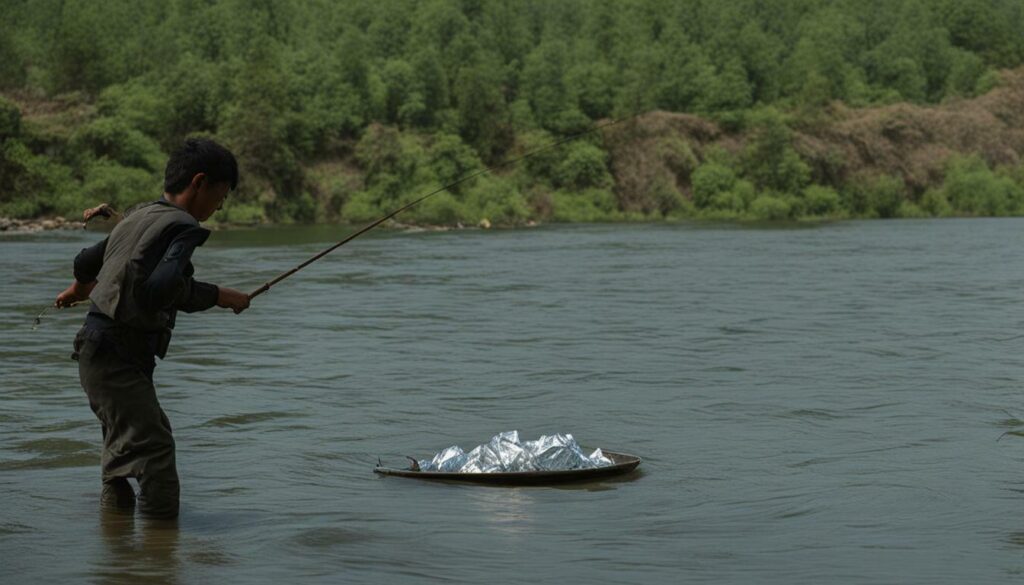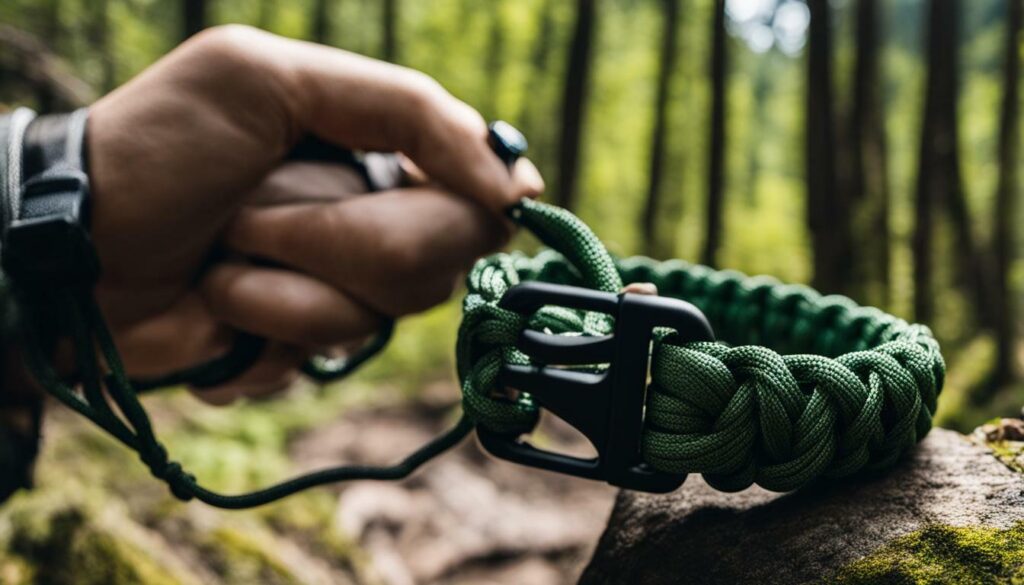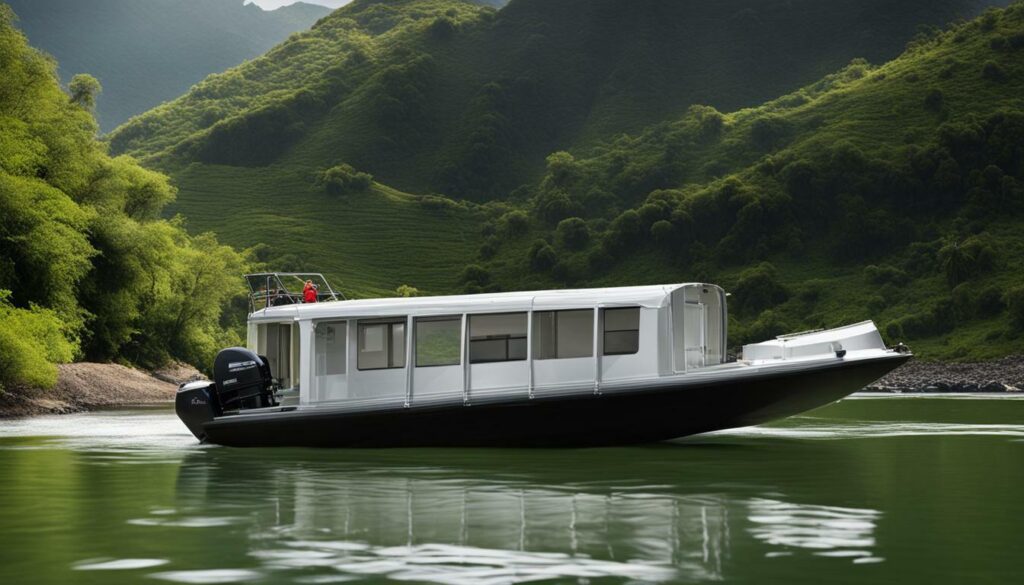

Welcome to your ultimate guide to Bug Out Boat Bug Out Shelter living. In this comprehensive guide, we will explore the essentials of emergency preparedness, survival gear, and the best practices for bug out boat and bug out shelter living. Being prepared for unexpected situations is crucial, and this guide will provide you with the knowledge and resources you need to ensure your safety and well-being in times of crisis.
Key Takeaways:
- Emergency preparedness is essential for survival in unexpected situations.
- A bug out bag (BOB) is a crucial item to have, filled with necessary supplies for survival.
- The four main necessities of survival include shelter, water, food, and security.
- Consider exploring bug-out locations near your current residence for emergency shelter.
- Be prepared to bug out in different scenarios, such as natural disasters or nuclear war.
By following the advice and information in this guide, you will be equipped with the tools and knowledge to navigate any emergency situation effectively. It’s time to take control of your safety and ensure the well-being of yourself and your loved ones. Let’s dive into the world of bug out boat and bug out shelter living together.
The Importance of Bug Out Bags (BOB)
When it comes to bug out boat and bug out shelter living, having a well-equipped bug out bag (BOB) is crucial. In this section, we will explore the importance of a bug out bag, including what to include in it and how to choose the right bag for your needs.
A bug out bag is essentially a survival kit that contains essential supplies to sustain you during an emergency situation. It should be compact, portable, and filled with items that are necessary for your survival. Whether you’re facing a natural disaster, a sudden evacuation, or any other unforeseen event, having a bug out bag can make all the difference.
So, what should you include in your bug out bag? Here are some key items to consider:
- Water: Pack water pouches or purification tablets to ensure a safe and adequate water supply.
- Food: Include non-perishable food items like energy bars, canned goods, and dried fruits.
- First aid kit: Have a well-stocked first aid kit with essential medical supplies and medications.
- Shelter: Include a lightweight tarp, emergency blanket, or tent for protection from the elements.
- Fire starter: Pack waterproof matches, lighters, or a fire starter kit for warmth and cooking.
- Multi-tool: Carry a versatile tool that can be used for various tasks, such as a Swiss army knife.
- Flashlight and batteries: Include a sturdy flashlight with extra batteries for visibility at night.
- Communication: Have a portable radio or a fully charged mobile phone with a backup power bank.
Choosing the right bug out bag is equally important. Look for a bag that is durable, water-resistant, and comfortable to carry. Consider its size and capacity to ensure it can accommodate all your essential items without being too bulky or difficult to manage. Additionally, opt for a bag with multiple compartments to keep your supplies organized and easily accessible.
Remember, your bug out bag should be tailored to your specific needs and geographical location. Consider the climate, terrain, and potential risks in your area when packing your bag. Regularly review and update the contents of your bug out bag to ensure everything is in working order and up to date.
Image:
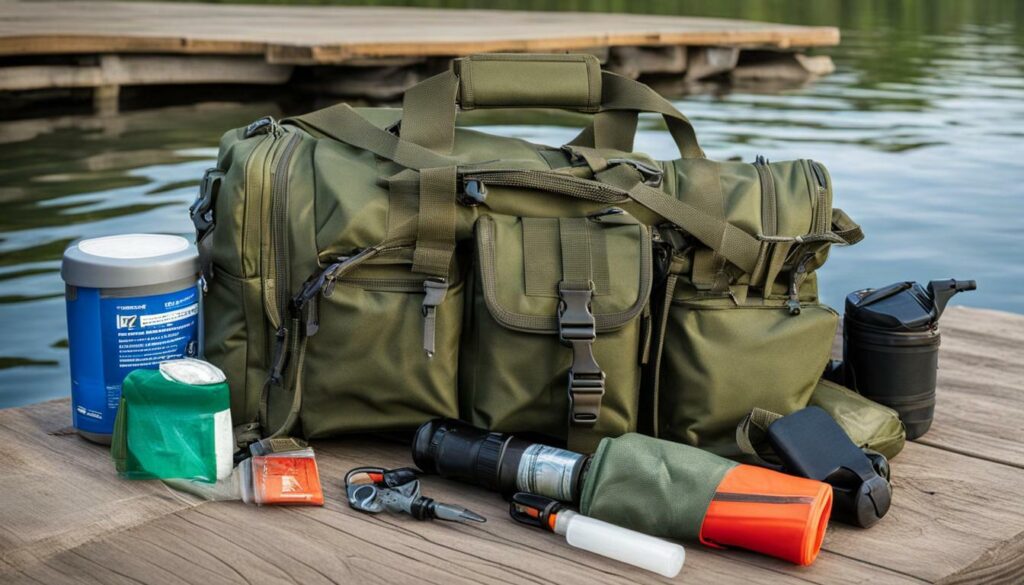

| Essential Items for Bug Out Bag (BOB) | Additional Supplies |
|---|---|
| Water pouches or purification tablets | Extra clothing and sturdy footwear |
| Non-perishable food items | Emergency cash and important documents |
| First aid kit and medications | Personal hygiene items |
| Lightweight tarp or emergency blanket | Navigation tools (compass, map) |
| Fire starter kit | Emergency whistle and signaling devices |
| Multi-tool or Swiss army knife | Entertainment (books, playing cards) |
| Flashlight and extra batteries | Compact sleeping bag or sleeping pad |
| Portable radio or fully charged mobile phone | Backup power bank |
The Four Main Necessities of Survival
In order to thrive during a bug out boat or bug out shelter scenario, it’s essential to address the four main necessities of survival: shelter, water, food, and security. Let’s explore each of these categories and learn how to ensure your preparedness in these areas.
Shelter
In a bug out situation, finding suitable shelter is crucial for protection from the elements and maintaining a sense of safety and security. Depending on the circumstances, shelter options can vary from tents and tarps to more permanent structures like cabins or underground bunkers. When selecting your shelter, consider factors such as durability, portability, and ease of setup. It’s also wise to have multiple options in case the primary shelter becomes compromised or inaccessible.
Water
Access to clean drinking water is vital for survival. In a bug out scenario, it’s important to have a reliable source of water or a way to purify it. Portable water filters, purification tablets, or a means to boil water are all essential items to include in your bug out bag. Additionally, consider having a suitable container for water storage and transportation. It’s recommended to carry at least one gallon of water per person per day.
Food
Having an adequate food supply is essential for long-term survival. Stock up on non-perishable food items that are lightweight, easy to prepare, and nutrient-dense. Canned goods, energy bars, dehydrated meals, and dried fruits are excellent options to consider. Don’t forget to pack necessary cooking utensils and a portable stove for meal preparation. Plan your food supply to last at least a few weeks, if not longer.
Security
In a bug out scenario, ensuring your safety and protecting your resources are critical. Carry essential items such as a multi-tool, a quality knife, a self-defense tool, and adequate personal protective equipment (PPE). Consider acquiring basic self-defense skills and knowledge to further enhance your security. Establishing a sense of security also extends to creating a solid bug out plan that includes strategies for avoiding danger and maintaining situational awareness.


| Category | Essential Items |
|---|---|
| Shelter | Tent, tarp, sleeping bag, mylar emergency blankets |
| Water | Water filter, purification tablets, portable water container |
| Food | Canned goods, energy bars, dehydrated meals, cooking utensils |
| Security | Multi-tool, quality knife, self-defense tool, personal protective equipment (PPE) |
Remember, being prepared and having the necessary supplies and knowledge in these four key areas will significantly increase your chances of survival in a bug out situation. Take the time to gather the appropriate gear, practice your skills, and develop a well-rounded bug out plan. Stay vigilant and always prioritize your safety and well-being.
Bug-Out Locations (BOL) and Considerations
When it comes to bug out boat and bug out shelter living, having a designated bug-out location (BOL) can significantly increase your chances of survival. In this section, we will explore the considerations for selecting a bug-out location and provide insights on the necessary emergency shelter and survival equipment.
When choosing a bug-out location, there are several factors to consider. Firstly, proximity to your current residence is important. Ideally, your bug-out location should be within a reasonable distance to ensure a quick and efficient evacuation. Additionally, consider the terrain and accessibility of the location. Is it easily reachable by road or water? Will it provide the necessary resources for survival?
Another important consideration is the availability of emergency shelter. Your bug-out location should have suitable accommodations to protect you from the elements and provide a safe space to wait out the emergency. This could be a cabin, a secure underground bunker, or even a sturdy tent depending on the location and resources available.
Lastly, don’t forget about survival equipment. Your bug-out location should be well-stocked with the essential gear and supplies needed for survival. This includes food, water, medical supplies, communication devices, and tools for self-defense. Consider creating a comprehensive inventory and regularly checking and replenishing your supplies to ensure you’re prepared for any situation.
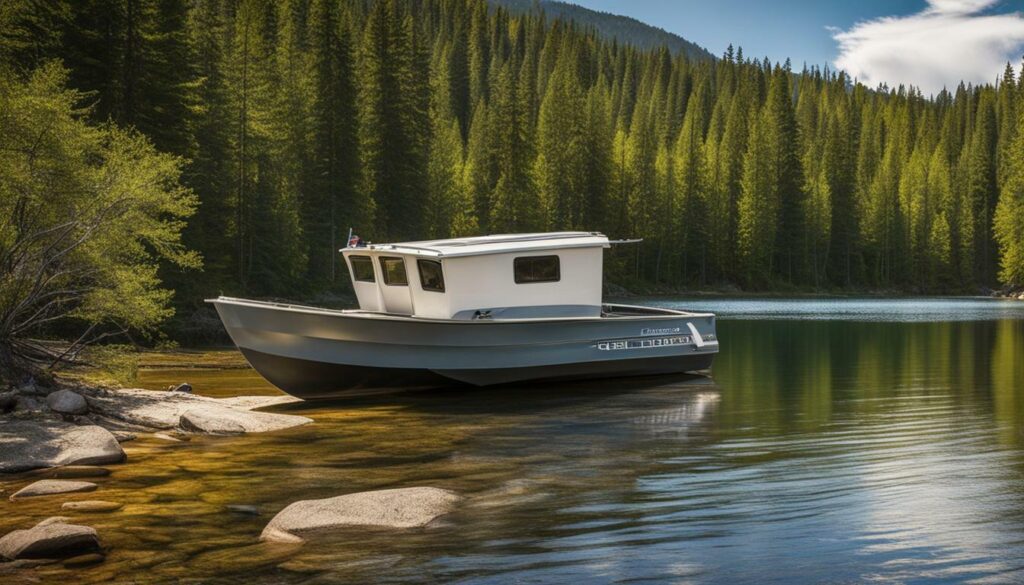

By carefully considering these factors and taking the necessary steps to prepare your bug-out location, you’ll be better equipped to face emergencies and increase your chances of survival. Remember, being prepared is key to staying safe in uncertain times. Stay informed, plan ahead, and always prioritize your safety and well-being.
Bugging Out in Different Scenarios
Bugging out requires careful planning and adaptation to specific scenarios. In this section, we will discuss the strategies for bug out boat and bug out shelter living in different scenarios, including potential scenarios like nuclear war, taking into account the experiences and insights shared by others who have faced similar situations.


When it comes to bugging out in the event of a nuclear war, preparation is key. Your bug out boat and bug out shelter should be equipped with the necessary resources and supplies to sustain you during the aftermath of such a catastrophic event. This includes radiation protection suits, water filtration systems, and long-lasting food supplies.
Creating a comprehensive bug out plan is crucial for navigating through different scenarios. Consider factors such as the proximity of your bug out location to potential targets, the availability of resources, and the accessibility of transportation routes. Having a well-thought-out plan will not only increase your chances of survival but also provide peace of mind during times of uncertainty.
Quote: “In the face of a nuclear war, it is important to have a bug out plan that prioritizes safety and self-sufficiency. The experiences shared by fellow survivalists have taught me the value of having a bug out boat and bug out shelter that can withstand the fallout and provide the necessary resources for long-term survival.” – Survivalist123
In conclusion, bugging out in different scenarios requires adaptability and resourcefulness. Whether it’s a nuclear war or any other potential disaster, having a well-prepared bug out boat and bug out shelter can significantly increase your chances of survival. Remember to gather insights from others who have faced similar situations to further refine your strategies and ensure the best possible outcome.
| Scenario | Top Considerations |
|---|---|
| Nuclear War | – Radiation protection suits – Water filtration systems – Long-lasting food supplies |
| Natural Disasters | – Secure bug out location away from disaster-prone areas – Emergency supplies for immediate evacuation – Communication plan with family and authorities |
| Social Unrest | – Security measures for bug out location – Self-defense equipment and training – Building a community of like-minded individuals for mutual support |
Being Prepared: The Key to Survival
Being prepared is the key to survival when it comes to bug out boat and bug out shelter living. In this section, we will explore the essential steps to take in order to be fully prepared for any emergency, including tips for emergency preparedness, bug out shelter readiness, and the necessary survival gear and equipment.
First and foremost, it’s crucial to have an emergency preparedness plan in place. This plan should outline the steps to take, the resources required, and the communication channels to use in case of an emergency. Make sure to involve all family members and discuss the plan thoroughly to ensure everyone is on the same page.
Next, focus on bug out shelter readiness. Your bug out shelter should be well-equipped with the necessary supplies to sustain you and your family during a crisis. Stock up on non-perishable food items, clean drinking water, first aid kits, and essential medications. Consider investing in a reliable generator, solar panels, and other alternative power sources to ensure you have access to electricity when needed.
Additionally, having the right survival gear and equipment is crucial for your bug out boat and bug out shelter. This includes items such as a multi-tool, flashlight, emergency radio, extra batteries, and protective gear. Make a checklist of all the essential items and ensure they are easily accessible, organized, and regularly maintained.


Remember, being prepared is not a one-time event. Regularly review and update your emergency preparedness plan, bug out shelter supplies, and survival gear to ensure everything is up to date. Practice evacuation drills with your family to ensure everyone knows what to do in case of an emergency.
By following these steps and being fully prepared, you increase your chances of survival during any emergency situation. Stay vigilant, stay prepared, and stay safe.
The Final Touches: Fine-Tuning Your Bug Out Plan
A well-designed bug out plan requires regular updates and practice to ensure its effectiveness. In this section, we will explore the final touches for fine-tuning your bug out plan, including tips on updating, practicing, and maintaining clear communication and coordination.
Firstly, it’s crucial to update your bug out plan regularly. As circumstances change, such as new potential bug-out locations or updated contact information, you need to ensure that your plan reflects these changes. Review your plan at least twice a year and make the necessary updates to stay prepared.
Secondly, practice makes perfect. Set aside dedicated time to run through your bug out plan with your family or bug-out group. This practice will help identify any weak points, ensure everyone understands their roles and responsibilities, and improve overall efficiency during an emergency situation.
Clear communication and coordination are also vital aspects of a bug out plan. Establish a reliable communication system to stay in touch with your bug-out group, family members, or emergency services. Regularly test your communication devices to ensure they are functioning correctly and consider having backup options available.
To summarize, fine-tuning your bug out plan involves updating, practicing, and maintaining clear communication and coordination. Remember, a well-prepared plan increases your chances of survival during an emergency. Stay vigilant, stay ready, and stay safe.
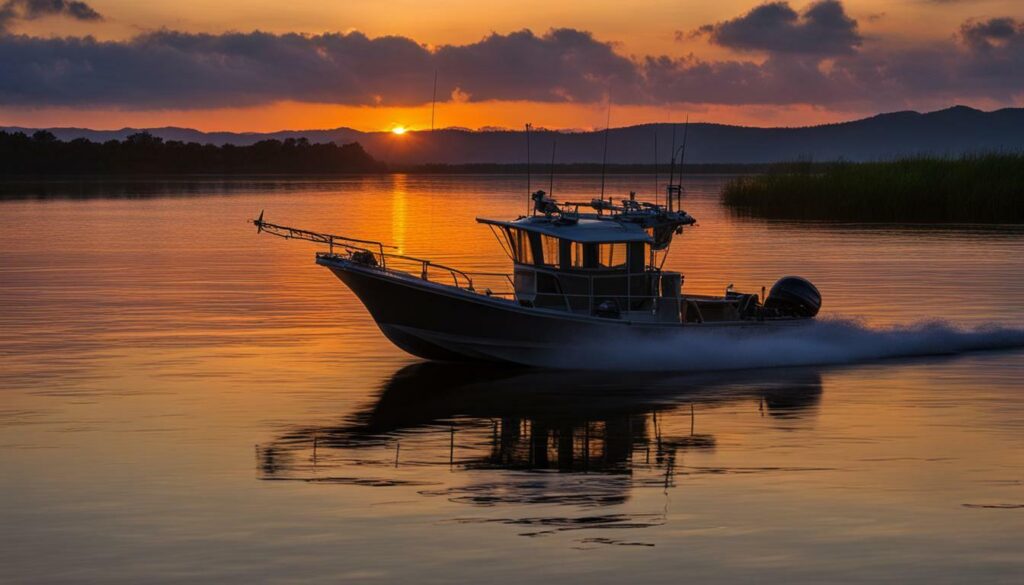

Congratulations on completing your ultimate guide to Bug Out Boat Bug Out Shelter living.
By now, you should have a solid understanding of the essentials for emergency preparedness, survival gear, and the best practices for bug out boat and bug out shelter living. You have learned about the importance of having a bug-out bag (BOB) filled with necessary supplies for survival, and how to select the right bag and pack it effectively.
We have also explored the four main necessities of survival: shelter, water, food, and security. You now have insights on how to secure these essential elements during a bug out situation, as well as tips on the best gear and strategies for each category.
Additionally, we discussed the concept of bug-out locations (BOL) and the importance of considering potential locations near your current residence. You have gained guidance on evaluating the suitability of a bug-out location and what to look for in terms of emergency shelter and survival equipment.
Throughout this guide, we have explored the considerations and strategies for bugging out in different scenarios, including nuclear war. The shared insights from forum discussions and experiences of other individuals will help you make informed decisions in emergency situations.
Remember, being prepared is the key to survival. By having a plan in place and fine-tuning it regularly, you increase your chances of navigating any emergency situation successfully. Stay focused, stay prepared, and stay safe.
FAQ
What is a bug out bag (BOB)?
A bug out bag is a backpack filled with essential supplies for survival in emergency situations. It is designed to be easily grabbed and taken with you when you need to evacuate quickly.
How do I select the right bug out bag?
When selecting a bug out bag, consider factors such as size, durability, and comfort. Look for a bag that can hold all your essential items and is made of high-quality materials.
What should I pack in my bug out bag?
Your bug out bag should include items such as food, water, a first aid kit, a flashlight, a multi-tool, extra clothing, a fire starter, and important documents. Make sure to pack enough supplies to last at least 72 hours.
What are the four main necessities of survival?
The four main necessities of survival are shelter, water, food, and security. It is important to have plans and supplies in place for each of these categories to increase your chances of survival in an emergency.
How do I evaluate a bug-out location?
When evaluating a bug-out location, consider factors such as proximity to your current residence, accessibility, availability of resources, and security. Look for areas with natural advantages, such as access to water and shelter.
What are some considerations for bugging out in different scenarios?
Bugging out in different scenarios requires different strategies. For example, in the case of a nuclear war, you may need to find a location with fallout shelter capabilities. It is important to research and plan accordingly for each scenario.
How can I fine-tune my bug out plan?
To fine-tune your bug out plan, regularly review and update it to ensure it reflects your current situation and resources. Practice your plan through drills, and communicate and coordinate with your family or group to ensure everyone is on the same page.
What is the key to survival in emergency situations?
The key to survival is being prepared. Have a bug out plan in place, gather the necessary supplies, and continuously educate yourself on emergency preparedness. Being proactive and ready can greatly increase your chances of survival.

